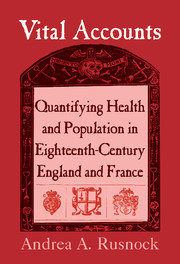Book contents
- Frontmatter
- Contents
- List of Illustrations
- Acknowledgments
- Vital Accounts
- Introduction
- 1 A New Science: Political Arithmetic
- PART ONE SMALLPOX INOCULATION AND MEDICAL ARITHMETIC
- PART TWO MEDICAL ARITHMETIC AND ENVIRONMENTAL MEDICINE
- PART THREE POLITICAL ARITHMETIC
- 7 Count, Measure, Compare: The Depopulation Debates
- Conclusion
- Bibliography
- Index
- Titles in the series
7 - Count, Measure, Compare: The Depopulation Debates
Published online by Cambridge University Press: 15 October 2009
- Frontmatter
- Contents
- List of Illustrations
- Acknowledgments
- Vital Accounts
- Introduction
- 1 A New Science: Political Arithmetic
- PART ONE SMALLPOX INOCULATION AND MEDICAL ARITHMETIC
- PART TWO MEDICAL ARITHMETIC AND ENVIRONMENTAL MEDICINE
- PART THREE POLITICAL ARITHMETIC
- 7 Count, Measure, Compare: The Depopulation Debates
- Conclusion
- Bibliography
- Index
- Titles in the series
Summary
In his brilliantly satirical Lettres persanes (1721), the French philosophe Charles Louis de Secondat, Baron de Montesquieu (1689–1755) asked somewhat seriously whether the modern world was less populated than the ancient world and answered a resounding yes. “After a calculation as exact as may be in the circumstances,” he asserted without providing any evidence of such calculations, “I have found that there are upon the earth hardly one-tenth part of the people which there were in ancient times. And the astonishing thing is, that the depopulation goes on daily: if it continues, in ten centuries the earth will be a desert.” Montesquieu not only saw the world's population as declining, but even more fundamentally, regarded it as changing. Population had a history as well as a future.
In mercantilist writings, population had generally been treated as a static or finite entity, and questions focused on geographical comparison: Was London larger than Paris? Was Holland more densely populated than England? By contrast, Montesquieu focused attention on temporal comparison and the dynamics of population – what the French called the movement of population. His dire prediction for a dramatic decline in population was regarded by contemporaries with alarm and propelled the subject of depopulation into the realm of public controversy throughout Europe.
- Type
- Chapter
- Information
- Vital AccountsQuantifying Health and Population in Eighteenth-Century England and France, pp. 179 - 210Publisher: Cambridge University PressPrint publication year: 2002



